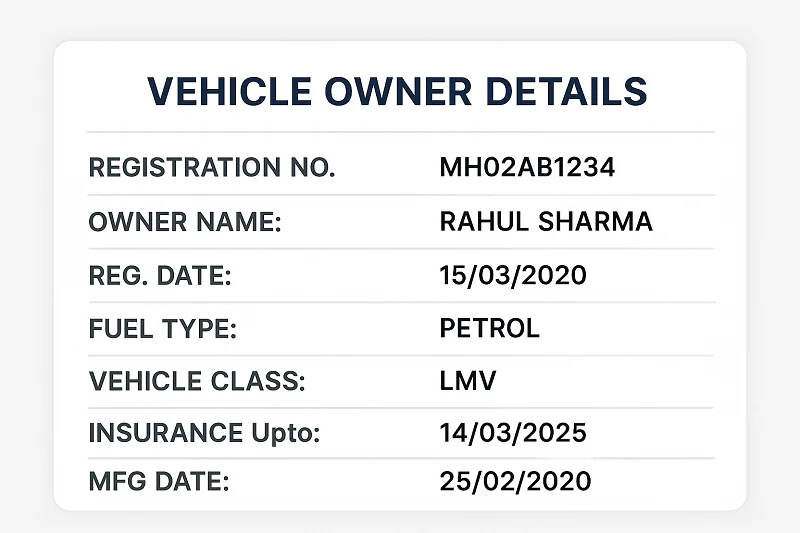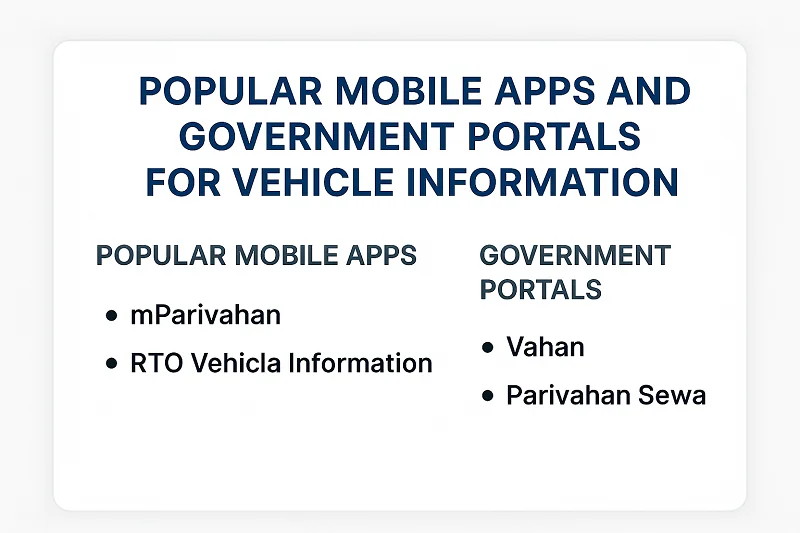Enter vehicle registration number to get owner and vehicle details
Click on any number below to test the system:
Fetching vehicle details from database...
Have you ever wondered who owns a particular vehicle or needed to verify vehicle information for legitimate purposes? Whether you’re buying a used car, involved in an accident, or simply curious about a vehicle’s registration details, understanding how to access vehicle owner details through RTO (Regional Transport Office) systems is essential knowledge for every Indian citizen.
In this comprehensive guide, we’ll walk you through everything you need to know about checking vehicle owner details legally and safely, with special focus on how RTO vehicle information systems work across India.
Vehicle owner details refer to the registered information about a vehicle and its owner maintained by the Regional Transport Office. This information typically includes:

People often need to check RTO vehicle info for various legitimate reasons:
For Used Car Buyers: Verifying ownership details before purchasing helps avoid fraud and ensures the seller is the legitimate owner.
After Accidents: Getting owner information for insurance claims or legal proceedings when involved in traffic incidents.
Property Verification: Landlords or neighbors might want to verify vehicle ownership in residential complexes.
Legal Proceedings: Lawyers and legal professionals may need vehicle details for court cases.
Personal Safety: Concerned citizens might want to report suspicious vehicles to authorities.
Understanding the Role of RTO in Vehicle Information Management
The Regional Transport Office (RTO) serves as the primary government authority responsible for vehicle registration, licensing, and maintaining comprehensive vehicle databases across India. Each state has multiple RTO offices that handle vehicle-related services for their respective regions.
When you register a vehicle in India, the RTO creates a permanent record containing all essential details about the vehicle and its owner. This information is stored in centralized databases that can be accessed through official channels.
The RTO system assigns unique registration numbers to each vehicle, following a standardized format that includes state code, district code, series letters, and unique numbers. For example, “MH 04 AB 1234” represents a Maharashtra vehicle registered in the Thane region.
Modern RTO offices have embraced digital technology, making vehicle information more accessible through:
Important Disclaimer: Always use official government channels and respect privacy laws when accessing vehicle information. Never use unauthorized third-party services that may violate privacy regulations.
Method 1: Official RTO Websites
Most state RTO departments offer online services where you can check basic vehicle information:
Step-by-step process:
Method 2: mParivahan Mobile App
The mParivahan app, developed by the Ministry of Road Transport and Highways, provides legitimate access to vehicle information:
How to use mParivahan:
Method 3: Vahan Portal
The national Vahan portal (vahan.parivahan.gov.in) offers centralized access to vehicle information across all states:
Using the Vahan Portal:
Method 4: SMS Services
Some RTOs provide SMS-based vehicle information services:
Detailed Focus: Maharashtra RTO and Thane Vehicle Information
Maharashtra, being one of India’s most populous states, has a well-developed RTO system with multiple regional offices. Let’s explore how to check vehicle owner details specifically in Maharashtra, with Thane RTO as our primary example.
Maharashtra RTO system is divided into multiple regions:
Using Maharashtra RTO Official Website:
Information Available Through Thane RTO Services:
Special Features of Maharashtra RTO System
Maharashtra RTO offers several advanced features:
Online Services: Comprehensive web portal with multiple citizen services
Mobile Integration: SMS and app-based services for quick information access
Digital Payment: Online payment options for various RTO services
Real-time Updates: Regular database updates ensuring current information
Legal and Privacy Considerations When Accessing Vehicle Information
Understanding the legal framework around vehicle information access is crucial for responsible usage.
What Information Is Publicly Available
Under Indian law, certain vehicle information is considered public and can be accessed legally:
Protected Personal Information
The following details are protected under privacy laws and not publicly accessible:
Legal Guidelines for Information Usage
Legitimate Uses:
Prohibited Uses:
Penalties for Misuse
Misusing vehicle owner information can result in:
Let’s walk through a complete process for checking vehicle owner details legally and safely.
Before You Start
Ensure you have:
Step 1: Choose Your Method
Select the most appropriate method based on your needs:
Step 2: Gather Required Information
You’ll need:
Step 3: Access the Service
For Website Access:
For Mobile App:
Step 4: Review and Verify Results
Check the information for:
Step 5: Use Information Responsibly
Official Government Applications
mParivahan:
Vahan Citizen Services:
State-Specific Applications
Maharashtra: Transport Department mobile app and website Karnataka: Karnataka RTO services portal Tamil Nadu: TN RTO online services Andhra Pradesh: AP Transport Department app Telangana: Telangana RTO services portal
Features to Look for in Official Apps
Security Features:
Functionality:
For those also looking to manage licensing needs, you can Driving License Download directly through official government portals like Sarathi Parivahan.

Using official government channels for checking vehicle owner details isn’t just about legality—it’s about ensuring accuracy, protecting privacy, and maintaining the integrity of the system.
Advantages of Official Methods
Data Accuracy: Government databases are regularly updated and maintained by authorized personnel, ensuring the most current and accurate information.
Legal Compliance: Official methods comply with all privacy laws and regulations, protecting both your interests and the vehicle owner’s rights.
Security: Government portals implement robust security measures to protect user data and prevent misuse.
No Hidden Costs: Official services are transparent about any fees and don’t have hidden charges like some third-party services.
Risks of Unofficial Methods
Legal Issues: Using unauthorized services might violate privacy laws and put you at legal risk.
Data Inaccuracy: Third-party services might provide outdated or incorrect information.
Privacy Risks: Unofficial services might collect and misuse your personal information.
Financial Fraud: Some unauthorized services might engage in billing fraud or identity theft.
Accessing vehicle owner details through RTO systems is a valuable service that serves many legitimate purposes in our daily lives. Whether you’re buying a used vehicle, dealing with an accident, or need vehicle information for legal reasons, understanding how to use official channels properly is essential.
Remember that with this access comes responsibility. Always use vehicle information services ethically and legally, respecting privacy rights and using the information only for legitimate purposes. The digital transformation of RTO services has made vehicle information more accessible than ever, but this convenience should never be misused.
By following the guidelines and methods outlined in this guide, you can safely and legally access the vehicle owner details you need while contributing to a more transparent and trustworthy system for everyone. Always prioritize official government channels, respect privacy laws, and use the information responsibly.
The RTO vehicle information system continues to evolve with new technologies and improved services. Stay updated with official announcements from your state transport department and central government portals to make the most of these valuable services while maintaining the highest standards of legal and ethical conduct.
Whether you’re in Maharashtra, Thane, or any other part of India, these principles and methods will help you navigate the vehicle information landscape safely and effectively. Remember, legitimate access to vehicle information is your right as a citizen, but using it responsibly is your duty to society.
mParivahan – Parivahan Sewa
Fancy Parivahan – Open Series Status
Sarathi Parivahan – Parivahan Sewa
Yes, it’s legal to access publicly available vehicle information through official government channels for legitimate purposes such as vehicle purchase verification, accident-related inquiries, or legal proceedings. However, using this information for harassment, stalking, or commercial exploitation is illegal.
Through official RTO channels, you can typically access vehicle registration status, basic vehicle specifications (make, model, year), insurance validity, PUC certificate status, and limited owner information. Complete personal details are protected by privacy laws.
Yes, most official government portals and apps provide basic vehicle information services free of charge. Some detailed services might have nominal fees, but basic verification is usually free.
RTO databases are generally very accurate as they’re updated regularly by official authorities. However, there might be slight delays in reflecting recent changes like address updates or ownership transfers.
If you discover incorrect information about your vehicle in RTO records, visit your local RTO office with proper documentation to get the information corrected. Most states also offer online correction services for certain types of errors.
Yes, using national portals like Vahan or mParivahan, you can check vehicle information across different states. However, some state-specific portals only provide information for vehicles registered within that state.
Most online services provide instant results. However, during peak hours or technical maintenance, there might be slight delays. SMS services typically respond within a few minutes.
Official government portals and apps implement security measures to protect user data. However, always ensure you’re using official channels and avoid third-party services that might compromise your privacy.
No, personal contact details like phone numbers and complete addresses are protected information and not available through public vehicle information services. Only basic identification information is accessible.
If you suspect a vehicle is stolen, immediately contact local police authorities. Don’t attempt to investigate further on your own. Provide them with the vehicle registration number and any other relevant details you’ve observed.

support@drivinglicencedownloader.com
+917428731894